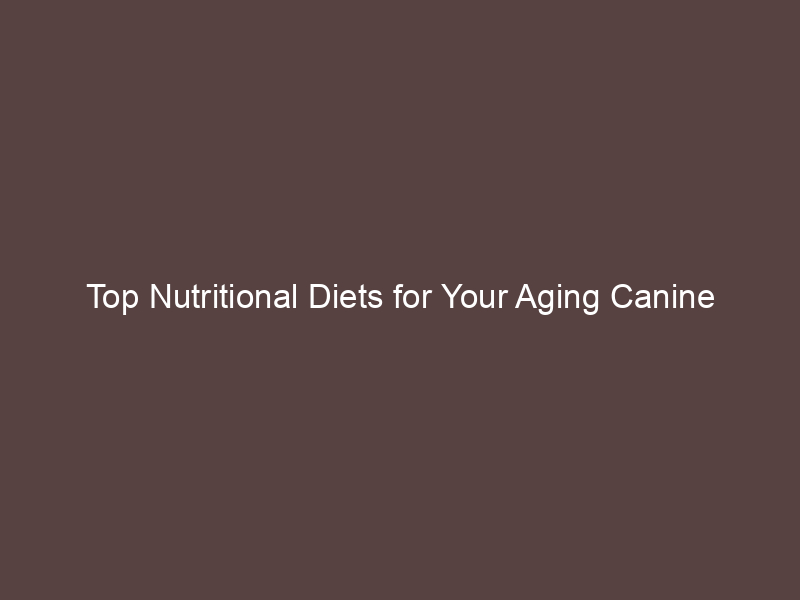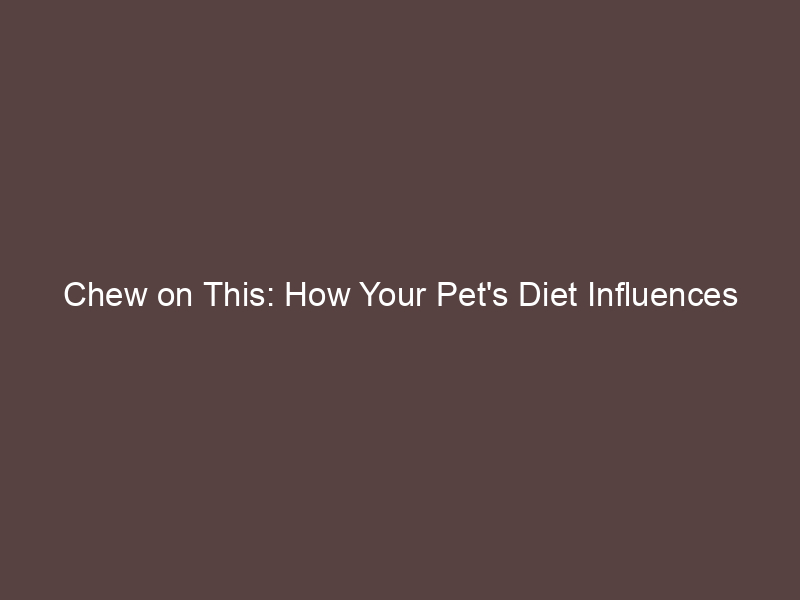Introduction to Aging Dog Nutrition
Just like humans, our furry friends also age and their nutritional needs change over time. As your dog enters its golden years, it’s important to understand how to adjust their diet to keep them healthy and happy. Let’s dive into the world of aging dog nutrition!
- The importance of a balanced diet for senior dogs
- Understanding the nutritional needs of aging dogs
As dogs age, their metabolism slows down, and they become less active. This means they need fewer calories, but the quality of those calories matters more than ever. A balanced diet is crucial to keep your senior dog’s weight in check and prevent health issues like obesity, heart disease, and arthritis. A diet rich in high-quality proteins, healthy fats, and a variety of fruits and vegetables can provide the necessary vitamins and minerals your senior dog needs.
Senior dogs have unique nutritional needs compared to their younger counterparts. They require more dietary fiber to aid digestion and less fat and calories to maintain a healthy weight. They also need more high-quality protein to preserve muscle mass. Additionally, certain nutrients like omega-3 fatty acids, glucosamine, and chondroitin can help support joint health and mobility in aging dogs. Always consult with your vet to create a tailored diet plan that meets your senior dog’s specific needs.
Remember, every dog is unique and what works for one might not work for another. It’s always best to consult with your vet before making any significant changes to your dog’s diet. With the right nutrition, your senior dog can enjoy their golden years in good health.
Senior Dog Diet: What Changes?
As our furry friends grow older, their dietary needs change. It’s important to understand these changes to keep your senior dog healthy and happy. Let’s dive into how aging affects a dog’s dietary needs.
How Aging Affects a Dog’s Dietary Needs
Just like humans, dogs experience changes in their bodies as they age. These changes can affect their metabolism, digestion, and weight. Let’s take a closer look at each of these areas.
- Changes in Metabolism
- Impact on Digestion
- Effect on Weight and Muscle Mass
As dogs age, their metabolism slows down. This means they burn fewer calories and may not need as much food as they used to. However, it’s important to note that every dog is different. Some senior dogs may still have a high metabolism, especially if they’re active. It’s always best to consult with your vet to determine the right amount of food for your dog.
Older dogs may have a harder time digesting certain types of food. This can lead to issues like constipation or diarrhea. To help with digestion, consider adding more fiber to your dog’s diet. Foods like pumpkin, sweet potatoes, and brown rice are great sources of fiber.
With a slower metabolism and changes in digestion, your dog may start to gain weight. On the other hand, some dogs may lose muscle mass as they age. It’s important to keep an eye on your dog’s weight and consult with your vet if you notice any drastic changes.
Understanding these changes can help you adjust your dog’s diet as they age. Remember, every dog is unique, so what works for one dog may not work for another. Always consult with your vet before making any major changes to your dog’s diet.
Key Nutrients for an Aging Dog Diet
As our furry friends grow older, their dietary needs change. It’s important to make sure they’re getting the right nutrients to keep them healthy and happy. Here are some key nutrients that should be included in an aging dog’s diet:
- Protein: Protein is super important for our old buddies. It helps maintain their muscle mass and keeps their immune system strong. It’s like the building block for their bodies. Make sure your dog’s food has high-quality protein sources like chicken, beef, or fish.
- Fiber: Fiber is a bit like a broom for your dog’s digestive system. It helps sweep away waste and keeps everything running smoothly. Foods like sweet potatoes, peas, and carrots are great sources of fiber.
- Omega-3 fatty acids: These are like the superheroes of the nutrient world. They help keep your dog’s skin and coat healthy, support their brain health, and can even help with joint pain. You can find Omega-3 fatty acids in fish and flaxseeds.
- Vitamins and minerals: Just like us, dogs need a variety of vitamins and minerals to stay healthy. Things like Vitamin A for eyesight, Calcium for strong bones, and Iron for healthy blood. A good dog food will have a balanced mix of these.
Remember, every dog is unique and might need different amounts of these nutrients. Always check with your vet before making any major changes to your dog’s diet.
Best Food for Old Dogs: A Comprehensive Guide
As our furry friends age, their dietary needs change. It’s crucial to understand what food is best for them to ensure they live a healthy and happy life. In this guide, we will focus on the best commercial dog food for older dogs.
Commercial Dog Food for Older Dogs
Commercial dog food specially formulated for senior dogs can be a great option. Let’s dive into the benefits and some top brands to consider.
- Benefits of Specially Formulated Senior Dog Food
- Top Brands to Consider
- Hill’s Science Diet: Known for their vet-recommended formulas, Hill’s Science Diet offers a variety of senior dog food options.
- Blue Buffalo: Blue Buffalo’s senior formulas are grain-free and packed with high-quality protein.
- Nutro: Nutro’s senior recipes are crafted with non-GMO ingredients and offer a range of options for different breeds and sizes.
Senior dog food is designed with the unique needs of older dogs in mind. It often contains less fat and more fiber, helping to manage weight and improve digestion. It also includes essential nutrients like glucosamine and chondroitin for joint health, and antioxidants to support the immune system. Feeding your old dog a diet specifically designed for their age can help them stay healthy and active.
When it comes to commercial dog food for older dogs, some brands stand out from the rest. Here are a few to consider:
Remember, the best food for your dog will depend on their specific needs. Always consult with your vet before making any major changes to your dog’s diet.
Choosing the right food for your old dog can make a big difference in their health and happiness. Whether you opt for commercial food or a homemade diet, the key is to find a balance that meets their nutritional needs.
Homemade Diets for Senior Dogs
As our furry friends age, their dietary needs change. One way to ensure they’re getting the right nutrients is by preparing homemade meals. Let’s dive into the benefits and drawbacks of this approach, and check out some tasty recipes your senior dog will love!
- Benefits and Drawbacks
- Sample Recipes
Homemade diets can offer numerous benefits for your senior dog. They allow you to control the quality and quantity of ingredients, ensuring your dog gets the right nutrients. Plus, homemade meals can be more appetizing for picky eaters.
However, there are also some drawbacks. Preparing meals can be time-consuming and expensive. Plus, it can be challenging to create a balanced diet. It’s crucial to consult with a vet or pet nutritionist to ensure your homemade meals meet your dog’s needs.
Ready to whip up some homemade meals for your senior dog? Here are a couple of simple, nutritious recipes to try:
Chicken and Veggie Stew: Mix boiled chicken, carrots, peas, and sweet potatoes. Add a dash of fish oil for a shiny coat.
Beef and Brown Rice: Combine ground beef, brown rice, and steamed broccoli. Add a spoonful of cottage cheese for extra calcium.
Remember, these are just starting points. Feel free to adjust based on your dog’s preferences and dietary needs. Always consult with a vet before making any major changes to your dog’s diet.
In conclusion, homemade diets can be a great way to cater to your senior dog’s specific needs. However, they require careful planning and consultation with a vet. Happy cooking!
Diet Plan for Aging Dogs: Tailoring to Specific Needs
Just like us humans, our furry friends also have unique dietary needs as they age. In this section, we’ll focus on overweight dogs and how to tailor their diet and exercise routine to help them maintain a healthy weight.
Overweight Dogs
Overweight dogs can face a variety of health issues, from joint problems to heart disease. But don’t worry, with a few simple changes, we can help our pups shed those extra pounds and enjoy their golden years in good health.
- Dietary adjustments for weight loss
- Exercise considerations
Firstly, it’s important to adjust your dog’s diet. This doesn’t necessarily mean less food, but rather smarter food choices. Opt for low-calorie, high-fiber dog food that will keep your dog feeling full without packing on the pounds. Also, try to limit treats and table scraps, which can quickly add up in calories.
Exercise is just as important as diet when it comes to weight loss. However, older dogs may not be able to handle the same level of physical activity as they used to. Start with gentle exercises, like short walks or play sessions, and gradually increase the intensity as your dog’s fitness improves. Always remember to consult with your vet before starting any new exercise routine for your dog.
Remember, every dog is unique, and what works for one might not work for another. It’s important to monitor your dog’s weight and adjust their diet and exercise routine as needed. With patience and consistency, your dog can reach a healthy weight and enjoy a happier, healthier life.
Dogs with Chronic Health Conditions
Just like us humans, our furry friends can also suffer from chronic health conditions. Let’s dive into some of the most common ones and how we can manage them through diet and care.
- Heart Disease
Heart disease in dogs can be a serious issue. A balanced diet low in sodium and high in omega-3 fatty acids can help manage this condition. Regular exercise, but not too strenuous, is also important. Always consult with your vet for the best advice.
- Diabetes
Diabetes in dogs is often managed with a diet high in fiber and low in fat. Regular meals and avoiding sugary treats can help keep blood sugar levels stable. Regular vet check-ups are crucial for monitoring this condition. Learn more about diabetes in dogs here.
- Arthritis
Arthritis can make your dog’s golden years a bit tough. A diet rich in omega-3 fatty acids can help reduce inflammation. Gentle exercise and maintaining a healthy weight can also help manage arthritis symptoms.
- Transitioning to a Senior Dog Diet
As your dog ages, their dietary needs change. Senior dogs often need fewer calories and more fiber. Transitioning to a senior dog diet gradually can help avoid digestive issues. Always consult with your vet before making any major diet changes.
- Monitoring Your Dog’s Health and Weight
Keeping an eye on your dog’s health and weight is key to managing chronic conditions. Regular weigh-ins and noting any changes in behavior can help you catch any issues early. Remember, prevention is better than cure!
- Regular Vet Check-ups
Regular vet check-ups are crucial for keeping your dog healthy, especially as they age. Your vet can provide personalized advice and catch any potential issues early.
Recap of Key Takeaways
Managing chronic health conditions in dogs often involves a balanced diet, regular exercise, and regular vet check-ups. Always consult with your vet for personalized advice.
Final Thoughts on the Importance of a Balanced Diet for Senior Dogs
A balanced diet can make a world of difference for senior dogs, especially those with chronic health conditions. Remember, our furry friends rely on us to keep them healthy and happy. Let’s do our best for them!






